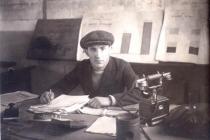Rosa and Ayzik Furman
This picture was made in Leningrad. In this photo you can see my parents: Rosa Furman and Ayzik Furman.
This is a combined photograph: a photo studio master made it from two originals to unite my parents in one photo. I wanted so much to have them both in one photo. I do not remember when it was taken.
My mother Rosa Shukhman (after her marriage - Furman) was the sixth child, as Naum was the youngest. My mum died in 2000, and she was one month younger 90. During the last 8 years she was bed-ridden - she could not walk.
Having got married, my parents lived in Ossinovaya Roscha. We lived there happily. There were four of us: mother, father, me and my brother Mikhail, who was born on December 20th, 1939.
We moved to Ossinovaya Roscha almost before the others, the military camp was under construction at that time, and their house was still damp, when they moved in. Our family occupied two rooms in one of the apartments.
There was also a small room near the kitchen, where father's aide-de-camp lived. We also had two neighbors, also military men, but I know nothing about them. And in this house we lived until 1941, when the war burst out.
When the war broke out, father left for the frontline with his unit on the first day. His unit was already mobilized and left the Ossinovaya Roscha. They moved towards the border with Finland which fought against the USSR together with Germany (6).
We stayed in Leningrad in Ossinovaya Roscha. In July 1941 father's unit was transferred from one location to the other and father managed to visit us together with his privates.
People were already being evacuated from Leningrad. Germans were quite close to the city at that time and last trains were leaving.
Father managed to evacuate us to the Gorky region [region in the basin of Volga river with a center in the town of Gorky, located 1,000 km to the south-east of Leningrad], where his aide-de-camp's mother lived.
We came to relatives of father's adjutant to Vad village of Gorky region. But that place seemed to my mum to be very much out of the way, because there was no place to live and she could not get a job. We could not even understand the dialect people spoke!
They added the word "chai" [in English: probably] after almost each word, when they said something, "Would you probably go there? Or would you probably not?" I remember how mother laughed after the war, sometimes saying, "Would you probably go there?" There were few people there.
Only primary school was available. Then mum got registered at local military enlistment office, and the local commander sent us to Vad village - a more civilized place, center of the district. At first mother worked in the collective farm, doing temp work, and then a military hospital evacuated from Ukraine appeared in Vad. And my mum went there for work.
At first she was a nurse (she had no special medical education), later she was taken to operating-room (my mother was very sociable and clever woman). An old professor (I do not remember his surname) was very nice to her and took care of her.
He knew that she had three little children, who suffered from hunger. At the hospital they gave her some food, and she did her best to bring it to us, children. And that professor saw her to be hungry and shared his ration with her (and so did his wife).
I remember that mother brought home used bandages from bandaging room. He gave it to her, advised to boil thoroughly. Mum used them to make clothes. He also tried to give her a glass or a spoon when the opportunity occurred.
In evacuation, my mum received letters from front line from my daddy - the last letter came in August 1942. I keep it as a family relic, because it is the last piece of news from my father.
It was written in pencil on a small sheet of paper. Having written that letter, he got lost, and we did not receive letters from him any more and knew nothing about him. Time passed and we got to know that he perished.













